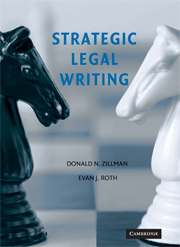Book contents
- Frontmatter
- Contents
- Origins of the Book
- What Is Strategic Legal Writing?
- Using the Text
- Introduction to Chapters One, Three, Five, Seven, and Nine
- Introduction to Chapters Two, Four, Six, Eight, and Ten
- Overview
- 1 Prayer at the Athletic Banquet
- 2 How to Draft a Complaint
- 3 Terminating Professor Melton
- 4 How to Draft a Motion
- 5 Mr. Blaustein's Gift
- 6 How to Respond to a Motion
- 7 Counseling Dean Covelli
- 8 How to Draft a Judicial Opinion
- 9 Advising Professor Melton
- 10 How to Draft a Motion for Summary Judgment
- Follow-Up Sections
- Index
3 - Terminating Professor Melton
Published online by Cambridge University Press: 08 February 2010
- Frontmatter
- Contents
- Origins of the Book
- What Is Strategic Legal Writing?
- Using the Text
- Introduction to Chapters One, Three, Five, Seven, and Nine
- Introduction to Chapters Two, Four, Six, Eight, and Ten
- Overview
- 1 Prayer at the Athletic Banquet
- 2 How to Draft a Complaint
- 3 Terminating Professor Melton
- 4 How to Draft a Motion
- 5 Mr. Blaustein's Gift
- 6 How to Respond to a Motion
- 7 Counseling Dean Covelli
- 8 How to Draft a Judicial Opinion
- 9 Advising Professor Melton
- 10 How to Draft a Motion for Summary Judgment
- Follow-Up Sections
- Index
Summary
Part of the work of the Legal Counsel's Office of the University of Katahdin is to review correspondence terminating the employment of any UK professor or staff member. These are important decisions for the university. They are equally important to the employee who faces involuntary separation from his or her job. Such terminations have given rise to litigation or threats of litigation that may be expensive for the university, may disrupt working relationships, and may give rise to unfavorable publicity about the University. The following correspondence and request for some strategic legal writing arises from such a situation.
THE UNIVERSITY OF KATAHDIN
Dear Counsel:
Assistant Professor Herman Melton has completed two years as a faculty member in the Sociology Department at UK. He is now in the Fall semester of his third year. Department and college officials have completed the standard review of his performance that will help determine his retention beyond the third year.
I summarize the paperwork and offer my comments as the senior administrator with responsibility for academic programs and faculty at UK. I ask you to prepare for my signature a letter to President McBee strongly recommending that we NOT offer a contract to Assistant Professor Melton for a fourth year and that we terminate any relationship with him after the end of this academic year in May.
Professor Melton's Department Chair reports that Melton's teaching evaluations regularly have been below the Sociology Department average. Melton does have several scholarly articles in print, but the Department Chair reports that they are in second-tier journals and none gives evidence of making a significant impact on his field.
- Type
- Chapter
- Information
- Strategic Legal Writing , pp. 45 - 62Publisher: Cambridge University PressPrint publication year: 2008



